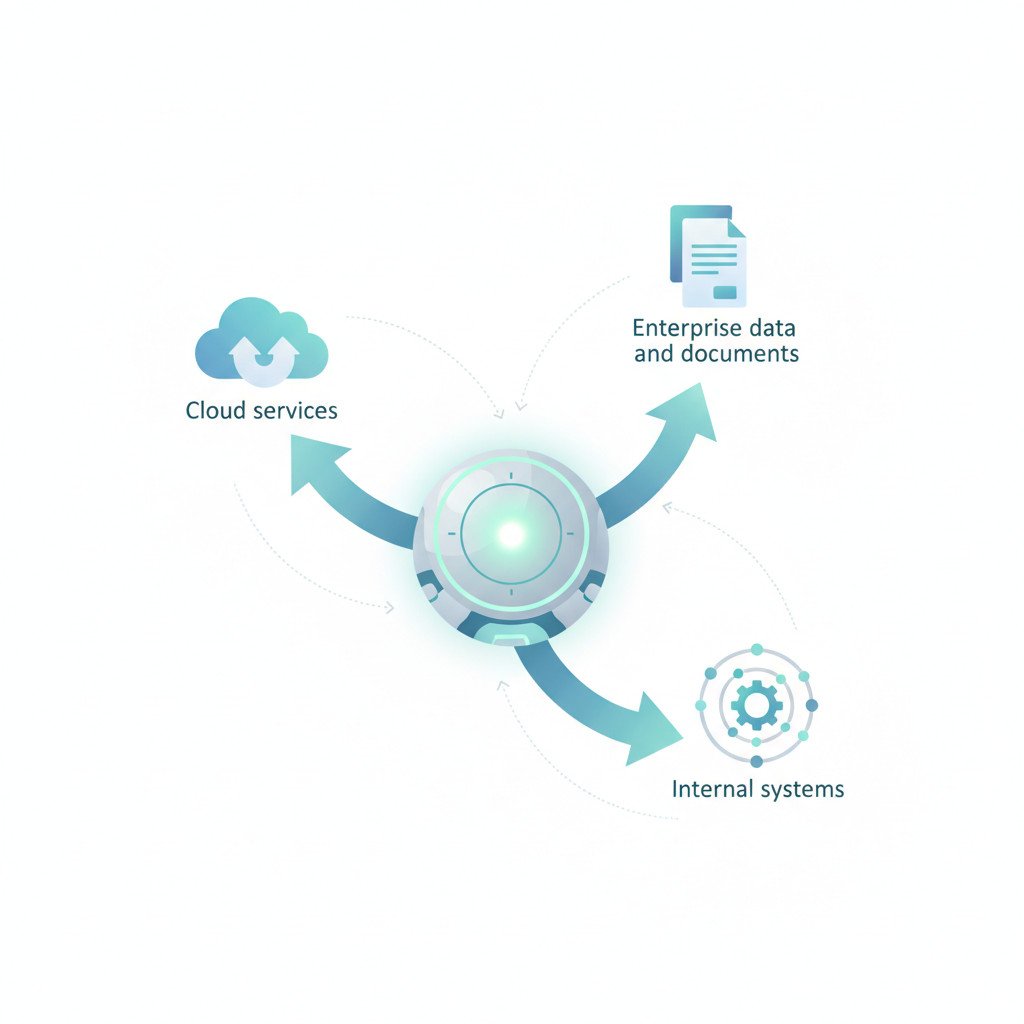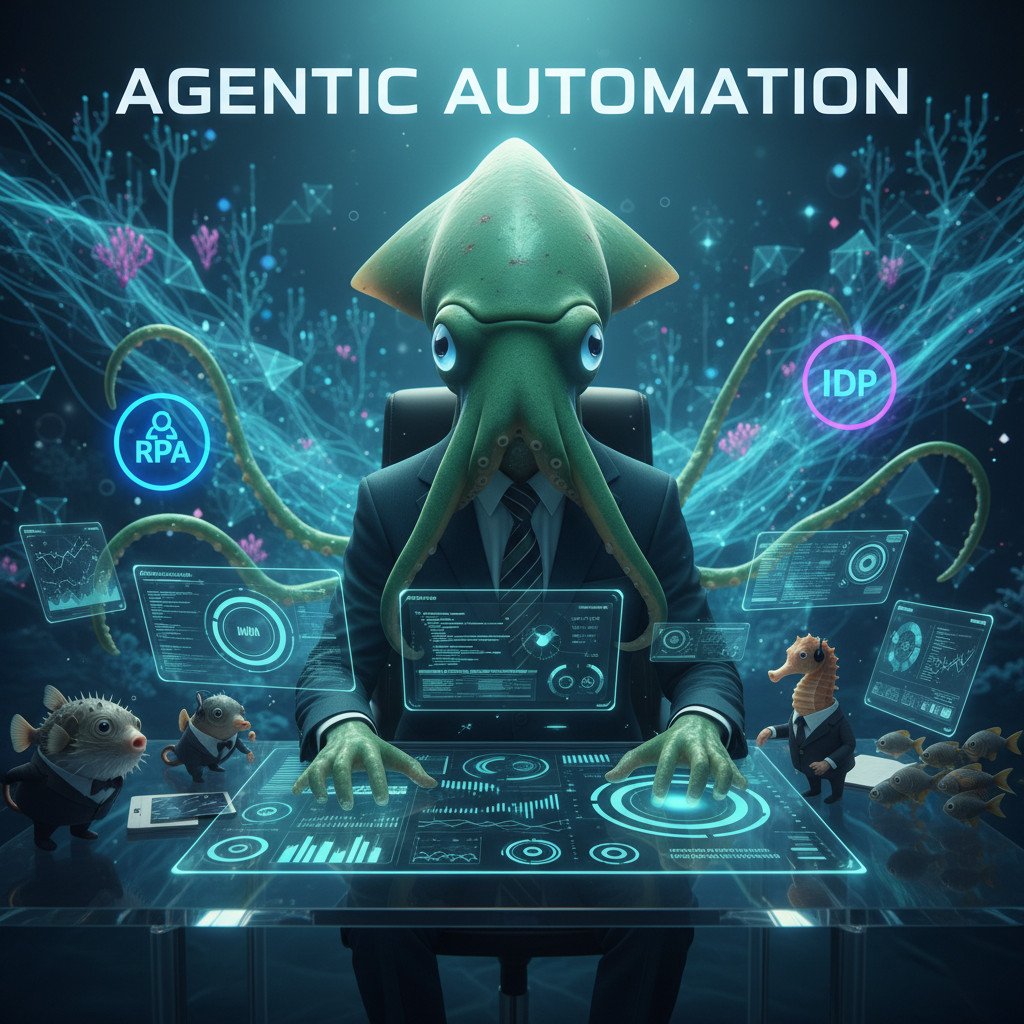Agentic AI: Preparing Enterprises for Success
Agentic AI refers to autonomous software agents that perceive, decide, and act to achieve goals. These agents combine planning, orchestration, and learning to carry out tasks across systems. They matter because they shift automation from script-driven tasks to context-aware decision making. However, their value depends on reliable data, governance, and human adoption.
This article explains how enterprises must prepare non-AI foundations for agentic AI success. We examine data quality, integration, process intelligence, agentic orchestration, RPA, and Intelligent Document Processing. Next, we address governance, role-based access, auditability, and legal compliance to reduce risk. Finally, we discuss mixed workforce design, change management, and metrics to measure impact and ROI.
Agentic AI can boost automation, speed decisions, and free human teams for higher value work. However, without strong data and governance, implementations will likely fail to deliver measurable impact. Therefore, this article focuses on practical steps leaders can take today. Readers will gain a checklist for readiness, plus examples and success metrics.
What is agentic AI?
Agentic AI describes autonomous software agents that sense environments, plan actions, and act to reach goals. These agents do more than predict outcomes. They make sequential decisions and operate across systems. As a result, they move automation from one off scripts to continuous decision making.
How agentic AI works
- Perception: agents read data from APIs, documents, sensors, and user inputs.
- Planning: agents build multi step plans and set priorities.
- Execution: agents call services, update systems, and monitor results.
- Learning: agents refine behavior from feedback and outcomes.
Agentic AI versus other AI
Agentic AI focuses on autonomy and action. By contrast, traditional AI models offer predictions or classifications. Meanwhile, RPA runs deterministic, rule based scripts. Also, simple chatbots provide single turn responses. However, agents coordinate tasks, manage exceptions, and adapt over time. Therefore, agents need orchestration, governance, and reliable data to succeed.
Related terms and concepts
- agentic orchestration, orchestration, governance
- data quality, process intelligence, change management
- RPA, Intelligent Document Processing, AgentPath
For practical guidance on implementation and readiness, see How Do You Implement Agentic AI in the Enterprise Without Breaking Data Pipelines and Governance? and What is Agentic AI readiness: governance, orchestration, and non-AI work for enterprise success, and why it matters?. Also, review infrastructure considerations such as What makes ‘NVIDIA Spectrum-X powers enterprise AI data centers with Oracle and Meta partnerships’ the backbone of high-throughput GPU networks in the data center?.

Agentic AI in business automation
Agentic AI automates complex end-to-end processes, not just tasks. For example, it can manage order-to-cash cycles across ERP, CRM, and billing systems. It monitors exceptions, routes approvals, and reconciles payments. As a result, teams see faster cycle times and fewer manual errors.
Common use cases
- Accounts reconciliation: agents identify mismatches and propose fixes automatically.
- Procure-to-pay: agents match invoices, flag anomalies, and schedule payments.
- Compliance monitoring: agents enforce policy checks and log decisions for audits.
Agentic AI in marketing and sales
Agents personalize outreach at scale, and they optimize campaign spend in real time. For instance, an agent can adjust bids across channels based on conversion signals. Therefore, marketing teams increase relevance and ROI.
Benefits include
- Dynamic personalization across channels
- Automated lead nurturing and qualification
- Real-time pricing and offer optimization
Agentic AI in customer service
Agents triage requests, resolve routine issues, and escalate complex cases. They learn from interactions and update knowledge bases. As a result, response times drop and customer satisfaction improves.
Examples
- Autonomous ticket routing and resolution
- Self-service claim processing with IDP integrations
- Proactive issue detection from monitoring data
Cross-industry benefits and considerations
Agentic AI delivers speed, scalability, and consistent decisions. However, success depends on data quality, governance, and orchestration. Investing in clean data reduces errors. Meanwhile, clear governance defines who can act, what agents can do, and how to audit outcomes. Finally, change management helps employees trust and adopt agents.
Agentic AI compared to other AI types
| Attribute | Agentic AI | Reactive AI | Predictive ML | RPA (Deterministic) |
|---|---|---|---|---|
| Autonomy | High autonomy across systems | Low autonomy, single step responses | Low to medium, suggests actions | No autonomy, scripted |
| Decision making | Sequential planning and goal driven actions | Immediate reactive output | Statistical predictions and scores | Deterministic rules |
| Learning ability | Learns continuously from feedback | Minimal learning | Learns from labeled data | No learning |
| Adaptability | Adapts plans to changing context | Rigid to context shifts | Moderate; needs retraining | Rigid, high maintenance |
| Typical use cases | End to end automation, orchestration, adaptive workflows | Event handling, control loops | Forecasting, scoring, classification | Data entry, form processing |
Agentic AI scales decisions across systems. Therefore it needs orchestration and governance.
However, it depends heavily on clean data and change management.
Treat agents as part of a mixed human and AI workforce.
Related keywords: agentic orchestration, governance, process intelligence, IDP.
Agentic AI and Enterprise Transformation
Agentic AI can transform enterprise operations by enabling autonomous decision making at scale. It shifts automation from brittle scripts to adaptive agents that plan, act, and learn. However, success depends on strong foundations like data quality, orchestration, and governance. Therefore, leaders must invest in clean data, role based controls, and clear audit trails. As a result, organizations reduce risk and unlock measurable ROI.
EMP0 (Employee Number Zero, LLC) is a US based AI and automation solutions provider. It helps businesses harness agentic AI for growth. In particular, EMP0 focuses on sales and marketing automation, combining agentic orchestration with process intelligence to drive pipeline and conversion. The company balances technical architecture with people centered training and practical change management.
For more resources, see the EMP0 website and the EMP0 blog. Connect with EMP0 on Twitter @Emp0_com or read additional insights on Medium and n8n.
Finally, agentic AI is not a magic fix. Instead it amplifies human teams when foundations are ready. Therefore, start with pilots that prioritize data, governance, and user adoption. With the right groundwork, organizations can scale agents safely and confidently.
-
What is agentic AI and how does it differ from regular AI?
Agentic AI uses autonomous agents that perceive, plan, act, and learn. Unlike predictive models, agents take sequential actions across systems. As a result, they close the loop between insight and execution.
-
What are common enterprise use cases for agentic AI?
Agents handle end-to-end processes such as order-to-cash, procure-to-pay, and autonomous ticket resolution. For example, agents can reconcile accounts, route approvals, and update CRM entries in real time.
-
What are the main advantages of agentic AI?
Agents speed decisions, reduce manual work, and scale complex workflows. Moreover, they improve consistency and free employees for higher value tasks. However, benefits depend on clean data and orchestration.
-
What challenges should organisations expect when deploying agentic AI?
Expect data quality, governance, and integration hurdles. Also, teams need change management to trust and adopt agents. Therefore, start with pilots and clear audit trails.
-
How will agentic AI evolve and what should leaders plan for?
Agents will become more capable and better integrated with business systems. Meanwhile, regulation and governance will mature. Consequently, leaders should invest in foundations such as data, role based controls, and process intelligence.

